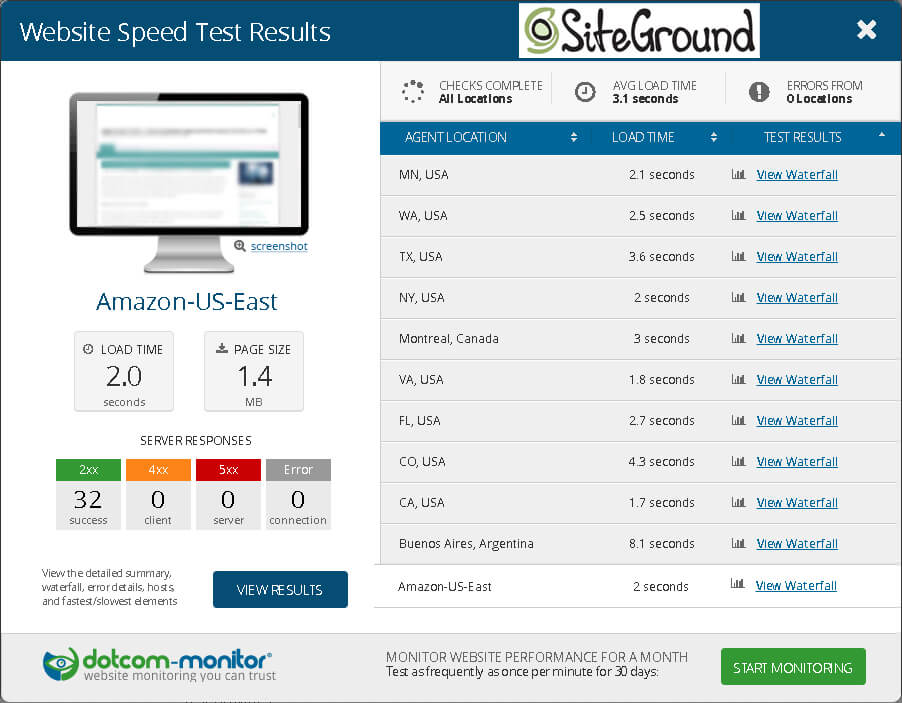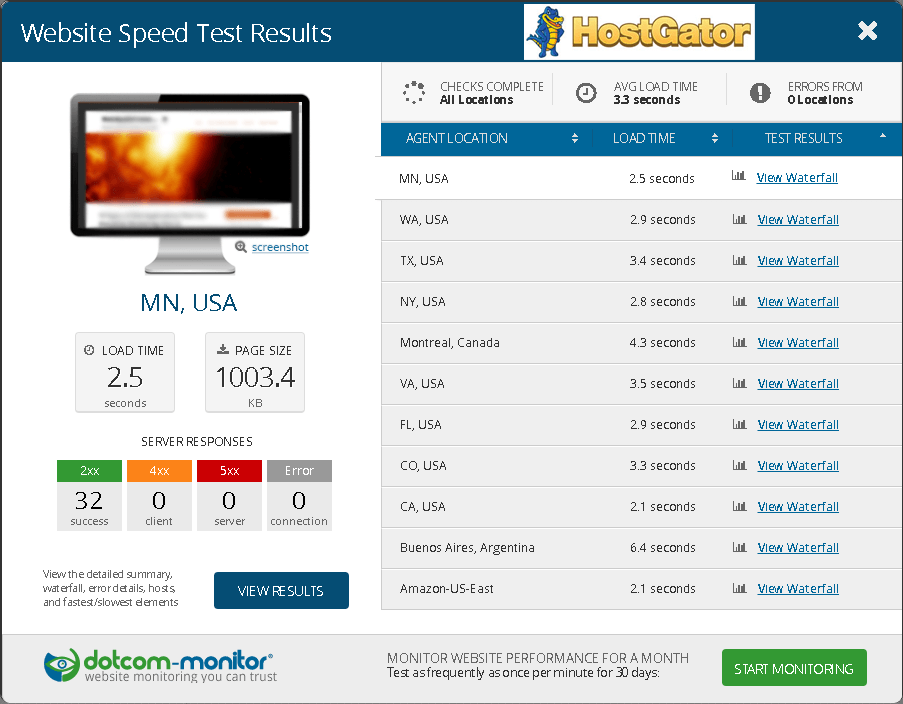SiteGround vs HostGator – Which Company Takes 1st Place?

Last Updated:
Trying to decide between SiteGround and HostGator? Well, you’ve come to the right place! WebHostingBuddy was created to provide honest, thorough, and technical reviews of web hosting companies—not to blindly recommend low quality hosts based on affiliate commissions!
SiteGround and HostGator are two of our all-time favorite companies, so we have a LOT of experience with each of them. HostGator was the first commercial web hosting that we ever purchased, and SiteGround is one of our go-to hosts when we want to host an important WordPress site on a budget. We really like both companies, so this is a fun comparison.
Before we go any further, we just want to mention that if you purchase hosting from one or more of the various businesses or companies on this page, we might receive a small affiliate commission. It doesn’t cost you any extra to purchase via our links and helps “keep the lights on,” with this site and also helps to keep us providing free content and reviews. We would definitely appreciate it if you did purchase via this page, but we also wanted to make sure you know that commissions don’t influence our reviews in any way. To prove that and to help keep the site honest, we created a page called Hosts We Don’t Recommend. Some of these hosts (such as iPage) offer high affiliate commissions and we still don’t recommend them. Ultimately, we want readers to know that this is an honest place to learn about web hosts.
With some of the introduction covered, let’s jump right in to SiteGround vs HostGator and see which company wins!
HostGator vs SiteGround: The Competition Categories
When reviewing any web host, it’s important to look at certain technical qualities and other aspects of the host that help to paint a complete picture of their overall competency and value. There are a few categories that we tend to stick to when evaluating any web host. These categories are:
— Reliability (Uptime Compared to Downtime)
— How Good is the Support & Customer Service?
— How Easy is the System to Use?
— Capabilities, Packages & Pricing
These categories serve as a good framework to evaluate both objective and subjective data about HostGator and SiteGround. In terms objective data, you’ll find a variety of performance test results available in each section on this page, as well as some more subjective opinions that come from our expertise in dealing with web hosts.
To keep things fair, we hosted one WordPress website on HostGator and another WordPress website on SiteGround. While these are different websites, they have essentially the same content length, same plugins, similar WordPress themes, and for testing purposes are very similar.
In order to gather a wide range of objective data, we tested the sites for 12 months using Dotcom-Monitor’s monitoring services, as well as their one-off speed tests available at Dotcom-Tools.com. With that said, let’s move forward and evaluate both hosts to see how they measure up in each category.
SiteGround versus HostGator: Overall Performance and Speed
We’ll say this right away—SiteGround and HostGator are two of the fastest (not specialty WordPress like WP Engine) mainstream hosts that we’ve ever worked with and we really have never been too disappointed with either. But, just our opinion doesn’t say enough in this area, so we ran each of the test websites through a complete speed test using Dotcom-Monitor’s free tools website (Dotcom-Tools.com). The fun thing about Dotcom-Tools is that you aren’t limited to one or two data centers—you can literally test your website for free from all over the world.
In order to keep things concise and simple, we limited the speed test to the American network (which includes 11 data centers). The way that test works is similar to WebPageTest.org if you’ve ever used that (except they provide more data). Essentially, Dotcom-Monitor’s servers go out and take a full-page download of the home page of each test site (one on SiteGround, and one on HostGator). Each element of the page is timed and calculated, as well as the overall page speed.
For this section, we’ll be focusing on the overall page speed as it’s the simplest metric to test—however, sometimes DNS or another problem is at fault for a slow-loading web page (that wasn’t the case for either of these tests). Looking at the following screenshots, you can view the results of the speed test summarized for both test sites.

Above, you’ll see a screenshot of the SiteGround speed test using Dotcom-Monitor, and below you can see the results of the HostGator speed test using Dotcom-Monitor. While the results are somewhat similar for certain locations, they vary quite a bit for others.

As we mentioned before, both of these hosts are quite speedy, and that’s evident in the test results. The best time that HostGator put on the board was 2.1 seconds, with an overall average of 3.3 seconds. The best time that SiteGround put on the board was 1.7 seconds (in multiple datacenters) with an average of 3.1 seconds overall, just edging out HostGator in the speed area. The goal for most websites is to have all pages load in under 3 seconds, and both hosts are right on the mark here.
In our opinion, HostGator is an excellent host in terms of speed, and they’re very speedy for a lower-priced host, but SiteGround was just a little bit faster here.
So, in the category of overall performance and speed, SiteGround is the winner.
And again—keep in mind that HostGator is still a quick host and a very good choice if you’re conscious of speed, it’s just that SiteGround does a little bit better job, and we think this is due to some of their caching technology as well as the fact that they manage their servers extremely well.
Reliability (Uptime Compared to Downtime) – HostGator and SiteGround
When shopping for a web host, most people understand that reliability is one of the most important features, hand-in-hand with speed and performance. Simply put, if your website isn’t inaccessible, it’s of no use to you or your visitors. Having a website that goes down at an inopportune time can be incredibly embarrassing for both businesses and individuals, especially if a lot has been done to promote the site recently and the news of it being down is spreading like wild fire through social media; this isn’t a situation anyone wants to be in.

Fortunately, most mainstream web hosts have pretty good uptime guarantees, but this doesn’t mean that they’re all created equally. In our experience, both HostGator and SiteGround have had great uptime for us on a personal and professional level. That said, we still wanted to put them to the test in order to get some objective data and numbers.
To do that, we used Dotcom-Monitor’s system in order to ping each website at 3 hour intervals for 12 months straight. Each site was pinged and checked for any uptime/downtime problems 24 hours a day, 7 days a week. Because this test ran for 12 months, it really gives a good picture of the reliability of each web host. With that said, let’s take a look at the numbers.
SiteGround had a 99.48% uptime rating over 12 months, which meant that the site was only down 0.52% of the over the entire year. While that might not sound like much (and it really isn’t), let’s put that into perspective. There are approximately 525,600 minutes in an entire year, so 0.52% of 525,600 = 2733 minutes, or about 45 hours over the year, or approximately 2 days. So the SiteGround test site was down for about a total of 2 days out of 365 days—not bad. And of course, that downtime most likely didn’t occur all at once.

The HostGator site had a rating of 100% uptime over 12 months, which is quite remarkable. This doesn’t mean that there was no downtime, it just means that it wasn’t detected because it didn’t occur at the 3 hour intervals. With 100% uptime, there are no downtime calculations to do. The default industry standard for SLA uptime performance is 99.9% so while SiteGround had a great rating, there were a tiny bit short of that—but not much. HostGator had a perfect score and exceeded even the industry standard.
With that being said, HostGator is the obvious winner in the category of reliability.
However, we really like SiteGround and would never classify them as an “unreliable” host by any means, so while HostGator was really perfect in this category, SiteGround is still very good. In fact, they’re currently (at the time of writing of this comparison) our favorite host to use with WordPress when we’re not using a premium host like WP Engine. They have been super reliable for us and while we’re not currently monitoring uptime on sites we have hosted with them, we haven’t noticed any downtime or dips in traffic, and some of the sites we’re hosting with them get a fair amount of traffic. So, just because they had a little downtime over 12 months doesn’t make them an unreliable host at all, they’re actually great.
Support and Customer Service—SiteGround Compared to HostGator
Support is something that can make or break a host—they can be fast, reliable, cheap, and whatever else, but if their support sucks it’s a real reason to consider a different host. The truth is that when there’s a problem with your website or web server, you really need answers fast and you can’t wait hours or even days with some of the worst hosts. Fortunately, SiteGround and HostGator both have good support, so let’s take a look at how they measure up.

Obviously this category is fairly subjective based upon our experience and the experience of our colleagues, but collectively that’s a lot of expertise. Each host has 24/7/365 chat, email, ticket, and telephone support—and that’s the way it should be. Due to the on-demand nature of the internet and websites, support should always be accessible from a good host and in many different ways (chat, email, phone, etc.).
Our experience with SiteGround support has been phenomenal. They are based overseas (somewhere in Eastern Europe it appears) but it doesn’t have any effect on the quality of their support—it’s awesome in all ways. Their first level techs know a ton, and if you have a problem that requires a more in-depth look, they will usually open a ticket and have someone start working on your problem, and this usually happens very quickly. Really, SiteGround has some of the best support of any host out there right now in our opinion.
HostGator’s support isn’t bad, but it really doesn’t compare all that well with SiteGround’s support at the moment. As we’ve mentioned on other pages, we believe that HostGator’s support used to be better but it’s really taken a dive in the last year or so (prior to the time of writing) in our opinion. HostGator’s biggest problem in the last year or so has been the increase in wait times. It was so bad at one point that they took over a week to respond to a ticket we had open and then issued us a one month credit because of the delay. While we appreciated the credit, that type of delay is unacceptable in the world of hosting, especially for a good host like HostGator.
Due to the delayed response times of HostGator lately, we believe that SiteGround really wins this category and it’s not just a small win…they win big here.
Hopefully in the future this is something that HostGator can fix since their technical support was every bit as good as SiteGround’s, at least from our perspective.
Which Host More User-Friendly? SiteGround or HostGator?
Some hosts have extremely confusing back-end panels (DreamHost), while others are easy-to-navigate and make a lot of sense. The most common back-end panel is cPanel, which we would call the industry standard, although there are some hosts that use Plesk and other similar panels. cPanel is very user-friendly and this is what both HostGator and SiteGround use.

When it comes to cPanel, there really aren’t any surprises and even a web hosting novice can figure it out without too much trouble (which is why so many hosts use it). Both HostGator and SiteGround put their own custom configuration on top of cPanel and they both do a good job with that. Each host adds some of their own features (like SiteGround’s caching feature) which is also fairly intuitive. Really in terms of the backend, there aren’t any surprises from either host and they both do a great job laying out the user interface.
Typically hosts have a separate billing/support interface that’s not part of the server backend, and again—both HostGator and SiteGround do a good job of making these easy-to-use, intuitive, and user-friendly.
In the area of UI/UX/ease-of-use, they both do an equally great job, so this area is a tie between both hosts.
Really, if you’re looking for a simple, clean, easy-to-use backend and support/billing portal, you can’t go wrong with either HostGator or SiteGround.
Capabilities, Packages & Pricing: HostGator & SiteGround
Pricing and features are always a consideration when choosing a host, and when it comes to web hosting, it is mostly true that you basically get what you pay for. As mentioned on other pages of this site, pricing is also one of the most confusing aspects of choosing as web host because it’s a common practice among web hosts to offer a low introductory rate and then raise the rates significantly upon renewal. Other services that operate this way are cable and satellite TV, and a variety of other subscription services.

With that said, both HostGator and SiteGround have fairly straightforward pricing and features. SiteGround has three main plans—“StartUp,” “GrowBig,” and “GoGeek.” Each of these has additional features as you move up to the next level such as premium support, free ecommerce tools, and more. If you’re a new customer, the plans are $2.99/month, $4.99/month, and $7.99/month. While SiteGround doesn’t specifically meter traffic, they do set a “visit count” on the number of unique visitors that each plan should be able to sustain in a given month. This is similar to the way that managed WordPress hosts meter their traffic, but SiteGround is actually more of a hybrid host in all honesty. Each plan includes 10GB/20GB/40GB of space, and again—more premium features are added as you move up in from one level to the next.
HostGator also has a few different pricing tiers with their “Hatchling” plan being the cheapest at $3.75/month. They next plan up is $4.50/month, and their top tier shared plan is $6.25/month. One thing HostGator does that SiteGround doesn’t is they offer “unlimited” everything so-to-speak. Bandwidth, storage, etc.—but most people know that there’s really no such thing as “unlimited” and if you abuse the services they can and will cap your usage.
Who takes the cake in terms of pricing? SiteGround, hands down.
HostGator used to be cheaper here, but that’s changed, and now SiteGround is the king of shared pricing in this matchup!
And the winner of the SiteGround vs HostGator battle is…
SiteGround.
SiteGround won in the speed, customer service, and pricing categories, while HostGator won in the reliability category, with the other category being a tie.
If we were to choose one of the two to use forever, we would choose SiteGround—because they are blazing fast and their support is out of this world awesome, and now, they’re cheaper too. HostGator is also an good host, but we think SiteGround has a slight edge here as shown be the testing (and again, they’re cheaper!).


